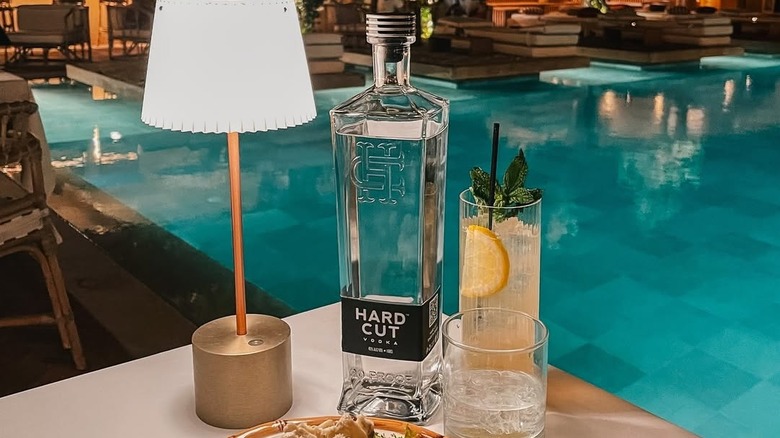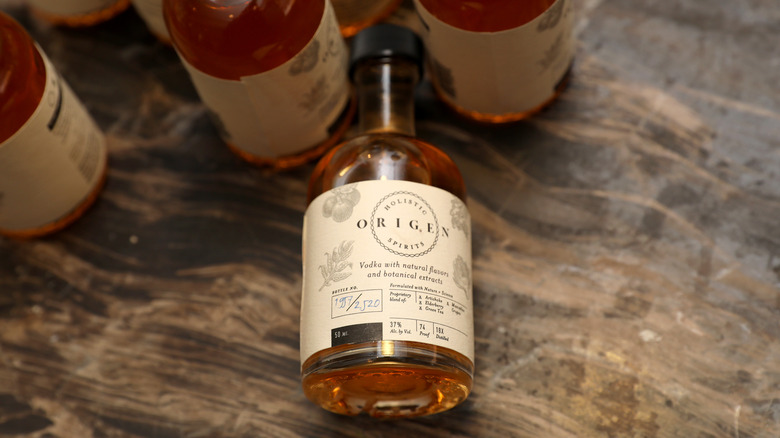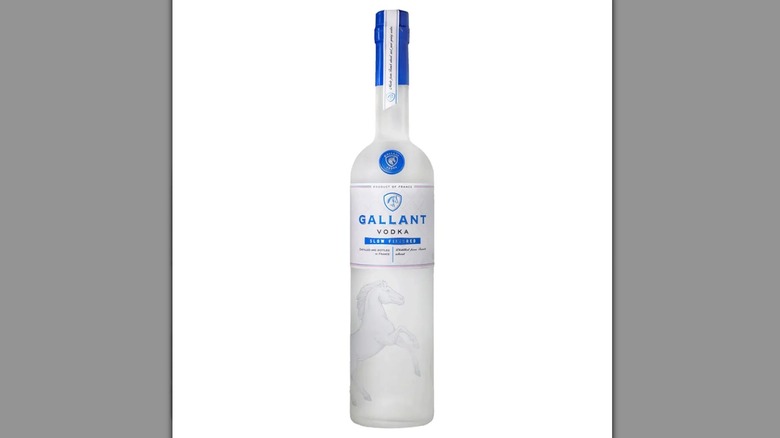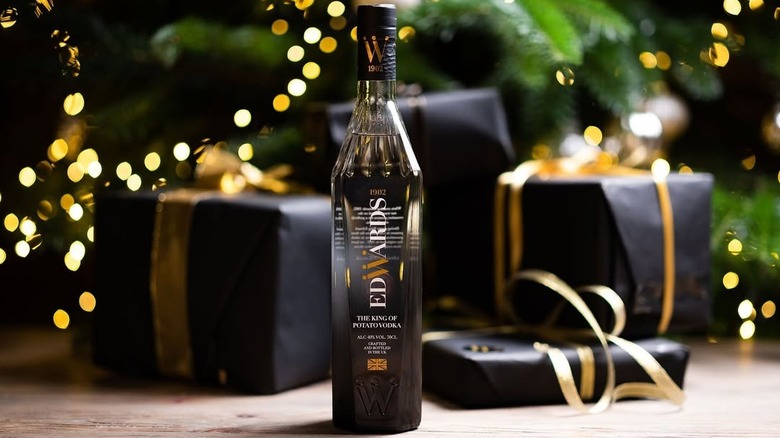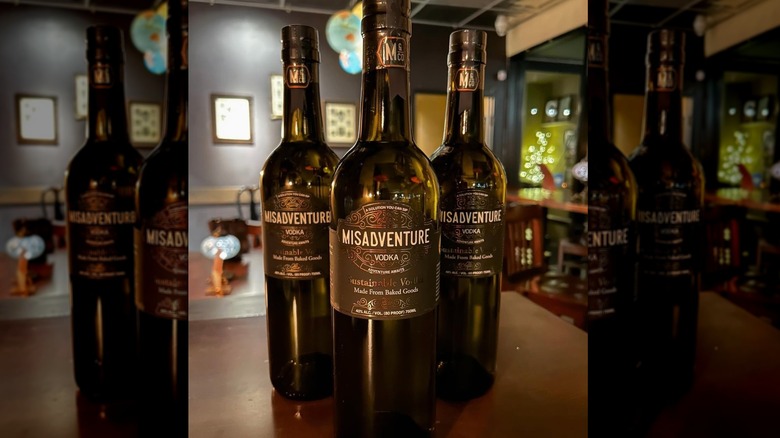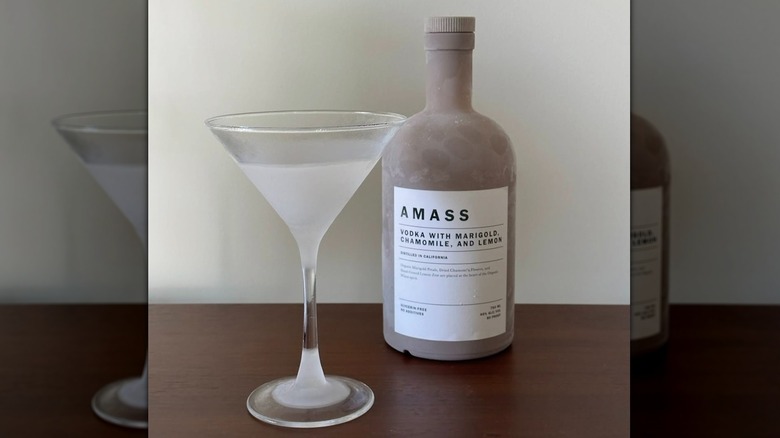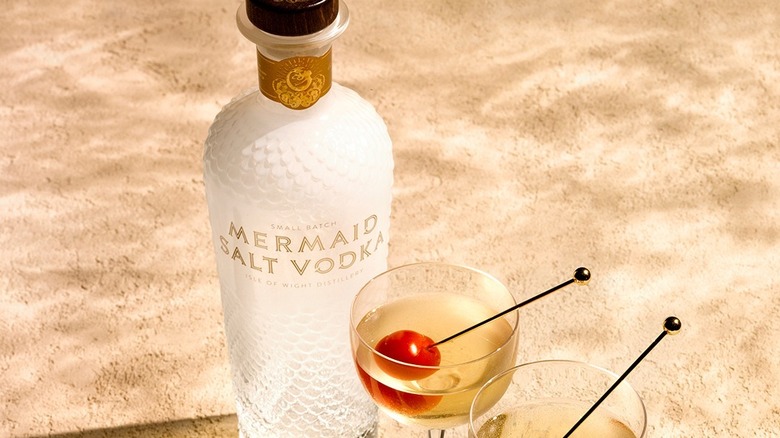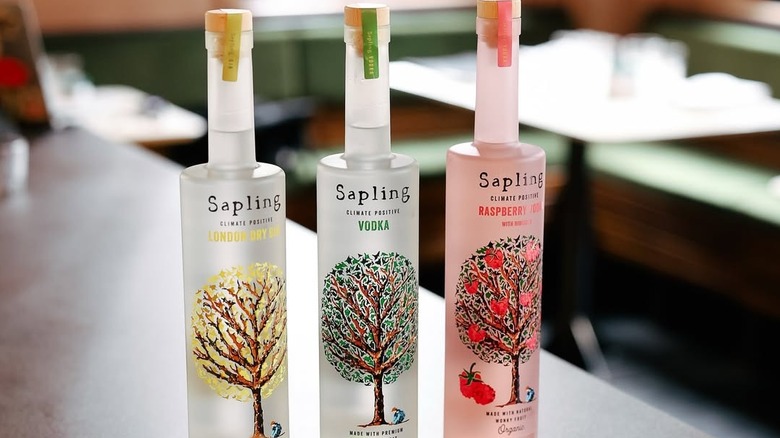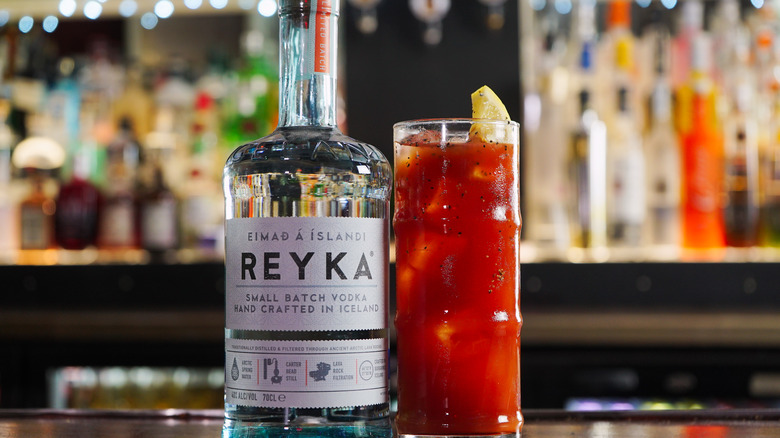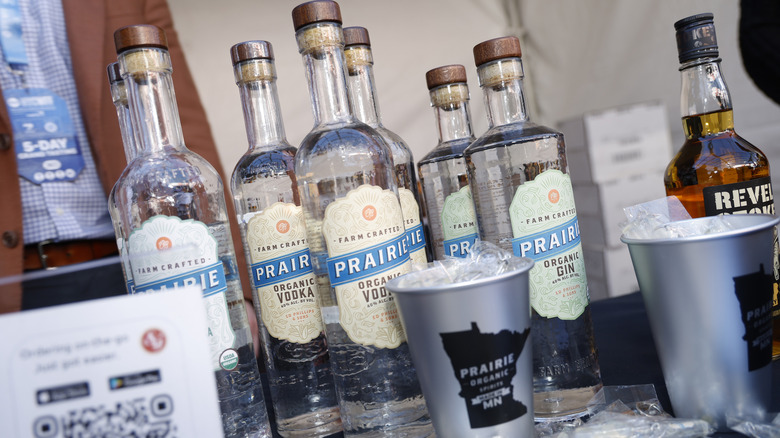10 Lesser-Known Vodka Brands You Should Be Paying Attention To, According To Experts
What to do if you want alcohol but just can't stand alcohol? Whip up a vodka martini, of course. Unless you reach for the kind of bottom-shelf stuff that hits you with notes of rubbing alcohol right off, you'll barely notice there's liquor in your glass. That's because vodka, by both law and tradition, isn't meant to leave a distinctive imprint.
Sure, there are thousands of brands out there. But with most chasing purity, you won't find much difference beyond the bottle design. Not to mention that coming up with something genuinely unique — something with terroir, sustainability, and real character — takes a lot of money and nerve. And even then, you might still end up with a copycat of some dominant premium label; a non-starter in an industry where innovation rarely trumps nostalgia.
With that kind of landscape, it's near-impossible for up-and-coming brands to stand out. But that doesn't mean there aren't some out there doing truly innovative things. We caught up with Molly Horn of Total Wine & More, master mixologist Nicolette (Nikki) Bonkowski, and beverage consultant Jonathan Kleeman for insight into vodka brands that, while yet to garner the kind of mass appeal toted by the likes of Absolut and Belvedere, are quietly pushing vodka beyond its "colorless, odorless, and tasteless" confines.
Hard Cut
Though vodka's been around for centuries, its popularity is pretty recent. It wasn't until post-war America that it really came into its own. Unlike today, when drinking is as much about self-expression as it is a social ritual, 1950s Americana absolutely frowned upon obvious drinking, ergo ripe for a spirit whose defining trait was disappearing.
But Eisenhower's been gone for decades, the post-war ice has long melted, and the world's ready for martinis that talk back. Unfortunately, not many in the industry have caught on. With the exception of a few Eastern European classics like Stolichnaya, expressive by tradition, most brands still favor production methods that strip vodka of all character. Enter Hard Cut Vodka: a potato-based spirit that prides itself on having far more talking points than your run-of-the-mill hooch. A fun fact: It's made by Hollywood's own Dolph Lundgren, and if you've seen "Rocky IV," you already know it's not the kind of vodka that's going to make a polite exit.
That was exactly Molly Horn's first impression, "It comes in at 90 proof with the tagline: "it stands up" (if you're a Dolph fan you'll appreciate this) — it tasted great, and I also think it's really interesting to offer a slightly overproof vodka that will, to their point, stand up to other flavors in a cocktail the way an overproof whiskey or a navy strength gin does," she says.
But Hard Cut's strength doesn't just come from bearing Ivan Drago's imprint; though that's definitely part of it. It's distilled from Idaho potatoes prized for their high starch and low water content, then proofed down with Rocky Mountain water — not just for poetic reasons, but for that subtle minerality you won't get from, say, glacial melt. But what gives Hard Cut its backbone is that it's bottled at 45% ABV, defying the industry's 40% standard. The higher proof allows the full-bodied flavor and earthy mouthfeel of the potato, along with the minerality of the water, to really shine through; resulting in a renegade vodka that clearly took the colorless-odorless-tasteless masterclass, but was bold enough to make tweaks.
Origen Holistic Vodka
Try as they may, homemade cocktails rarely come close to something you order at the bar. And while a great part of that difference comes down to bartender finesse, there's something to be said about choice of liquor.
While you're likely to reach for nostalgic comforts like Belvedere or Grey Goose, bartenders tend to be more adventurous; confident enough to reach for hooch that doesn't pander to the mainstream. "Bartenders tend to be really inspired by and drawn toward spirits that have distinct character when coming up with new cocktails," Molly Horn tells us.
One of those bold, unconventional picks is Origen; a vodka so beloved by bartenders it won silver at the 2024 Bartender Spirits Awards. Distilled from organic wheat, gluten-free, sugar-free, additive-free, and non-GMO, Origen's what happens when wellness, sustainability, and getting sauced on a Saturday night meet unexpectedly and decide to coexist. "It has a really unique flavor profile as it is infused with elderberry, muscadine grape, artichoke, and green tea, giving it subtle uncured olive and citrus notes with a touch of acidity and brininess," Horn says.
With such an auspiciously complex flavor profile, you already know you'll be getting something of a culinary experience even if you opt to sip this one neat. Opening the sip is that olive-and-brine interplay, which stretches into a long, caramel-tinged finish that feels almost lush on the palate. The botanicals marry beautifully into a cocktail, too, imbuing just enough flex to remind you that not all vodkas are meant to vanish. "It's subtle enough to still be vodka while still providing an exciting approach to a vodka cocktail," Horn says.
Gallant Vodka
If you've ever skimped on your liquor and ended up with something bordering on rubbing alcohol, you already know that going budget on vodka rarely pays off. Very rarely will you stumble across a hooch that's both premium-quality and accessible. There are a few unicorns, of course, one of which is Gallant, a French vodka intended for the American market.
Like most premium varieties, it boasts an ambitious production process. It's fermented from winter wheat harvested at its prime from the Cognac region of France, proofed with spring water from the Gensac spring, and filtered over the span of a week to give it a clean finish. And clean here by no means implies neutral. Gallant totes a unique flavor profile; approachable but bold enough to hold its own in a cocktail.
It picks up with a bright orange zest tempered by honey malt and subtle notes of tea, flows out silky and dry, and wraps up with toasty layers of black pepper, almond, and vanilla nougat. The subtle complexity, of course, gives it tremendous versatility when mixing, as Molly Horn attests. "It has a really lovely creaminess and a hint of citrus that makes it perfect for everything from a Classic Martini to a Moscow Mule to a Cosmopolitan."
All that's pretty seductive on its own, but the real coup de maître is the price tag. Premium brands like Grey Goose can run upwards of $30, sometimes more depending on how ultra you like your hooch. Gallant comes in at just under $20 in most markets, incredibly accessible for a spirit that boasts the same origins as storied cognacs like A de Fussigny L'Héritage.
Edwards 1902 Vodka
Unlike whiskey and gin, whose craft movements have decades in the making, craft vodka has only recently begun to garner traction. Austere old-world traditions still dominate, which means a great majority of brands lean toward production techniques that strip character, leaving a clean, neutral product; perfect for playing invisible accomplice to a cocktail.
But times have changed. Flavorless vodka is slowly losing steam, and there is a growing appeal for production techniques that don't muffle origin, with terroir slowly becoming as expected of vodka as it is with, say, bourbon. One brand that's been making small waves in this respect is Edwards 1902. A product of England's Elsham Wold Distillery, Edwards 1902 Vodka is made from single-estate King Edwards potatoes grown in the Lincolnshire region. Owing to its low water and high starch content, this spud variety imbues the product with a distinctive flavor profile that you're unlikely to get from any other potato-based vodka. Provenance is so at the heart of Elsham Wold that even its flavored expression, Edwards 1902 Rhubarb, draws its rhubarb straight from the Rhubarb Triangle; a 9-square-mile patch of West Yorkshire that once supplied nearly all the world's rhubarb.
Beverage consultant Jonathan Kleeman tells us that Edwards 1902 boasts "a remarkably creamy texture," which makes it perfect for sipping or mixing into a cocktail where a bolder liquor choice is called for. Like many terroir-driven vodkas, King Edwards comes in with a steeper price tag, hovering around $40 for the classic expression, which, while somewhat intimidating, might be appealing to vodka lovers with no qualms paying a little extra for a spirit that tells a story.
Misadventure Vodka
Demand for domestic vodka is on the rise, and if there's one thing you can count on American distillers to keep doing, it's taking an almost mannerless latitude with base material. Quinoa, agave, honey, milk; as long as it's got a serviceable sugar content, it's probably on its way to an American still somewhere. But aside from making for a quirky backstory, it's rare for this free rein to make any real impact; unless your palate is snobby enough to detect traces of quinoa.
One vodka making a real-world impact with its unusual choice of base material is Misadventure; a grain-based vodka made by California's Misadventure Co. Grain here is used a little liberally, though. "They take excess baked goods that would otherwise go to waste and ferment those baked goods to develop a recipe for distilling vodka," Nikki Bonkowski tells us.
Up-cycling baked goods is, of course, a pretty innovative way to make vodka, especially if you consider just how much of the stuff goes to waste. But it goes even further than that. Liquor distillers use up an inordinate amount of the world's grain, creating a supply deficit that escalates prices for people who actually need grain for food. And while small batch, Misadventure is proof that grain-based vodka can come about in a more sustainable, albeit less traditional, route.
And it doesn't have to be purely for altruistic purposes. Retailers like Costco pretty much give unsold baked goods away, so it might save a buck or two; which might explain why Misadventure's price point hovers around $20, surprisingly accessible for a vodka claiming to have a zero carbon footprint.
Amass Vodka
Buying flavored vodka is always a gamble. You might get something with a delicate blend of botanicals that takes your breath away or something about as sophisticated as cough syrup, only arrogant enough to cause a coughing fit rather than cure it. While you're almost guaranteed a decent outcome with premium brands like Belvedere and Grey Goose, it's pretty much a dice roll beyond those very tight confines.
But that doesn't mean there aren't boutique brands pushing the boundaries on this front. One of these is Amass, a craft vodka that ditches artificial flavors and additives in favor of meticulous infusion techniques to impart flavor. Initially distilled in Copenhagen, Denmark, but now a product of California, Amass is initially distilled from wheat, from where it's perked up with a delicate blend of over two dozen botanicals. Nikki Bonkowski tells us that Amass is "distilled with chamomile, marigold, and lemon" and is "rich in the Nordic distilling tradition of blending botanicals meticulously to create a subtle flavor profile of florals and citrus."
The flavor profile is about as nuanced as the production process suggests. Up front is the bitter citrus, then follows airy, slightly tannic florals and iced tea, and on the finish are the faintest hints of wildflowers and grain. The price point, at $39.99 for a 750 milliliter bottle, is a bit of a splurge, but if you're looking to branch out from heralded brands without risking regret, it's pretty justifiable.
Mermaid Salt Vodka
Unless you're a seasoned connoisseur, every vodka you come across pretty much tastes the same. That's because production techniques strip away the underlying character of the base material and the minerality of the water, leaving a clean, polished distillate that practically evaporates on the tongue. But all that might be changing as craft distillers reshape the way the world thinks about vodka. Spirits with personality and provenance are slowly gaining ground. One of those trailblazers is Mermaid Salt Vodka.
Like most grain-based vodkas, Mermaid Salt is column distilled for purity and consistency. The distillate is then proofed down to the standard 40% ABV using spring water from the Isle of Wight. At this point, most grain-based vodka producers would call it a day. But Mermaid Salt goes an extra mile, infusing the final product with sea salt harvested from the south of the island, lending a nautical, terroir-ish twist that's especially laudable in a category long dominated by neutrality.
"It is super unique and really delicious with a delicate trace of salinity! Not only is it great for Dirty Martinis and Bloody Marys, but that touch of salt on the palate adds incredible balance to anything from a classic Cosmo to an Espresso Martini," Molly Horn tells us.
The salty angle might be a little unconventional, but things might not stay that way, at least, according to Horn. "With the continued shift toward more balanced, less sweet cocktails that has continued to spread across the country over the last two decades, I think this will be a big hit!"
Sapling Vodka
The world's finally waking up to the reality that unsustainable businesses have drastic — often irreversible — impacts on communities, ecosystems, supply chains, and economies. Ignorant indulgence is out, and conscious consumption is in. Now more than ever, consumers are giving pause before buying products that don't at least pretend to support green initiatives. Naturally, corporations — distillers not exempt — are now scrambling for a seat on the sustainability bandwagon; some with genuine intent. Up-cycling stillage, using unusual ingredients, switching to energy-efficient stills; just a few of the ways distillers are contributing to the sustainability movement. Among the craft distillers leading the charge is U.K.'s Sapling Spirits, maker of Sapling Vodka.
Sustainability is such a core part of Sapling's identity you'll have an easier time finding parts of the operation it doesn't factor in. It's made from British organic winter wheat, which cuts down transport emissions. Beverage consultant Jonathan Kleeman tells us that Sapling also plays around with packaging to further its climate-positive claims. It, for instance, has a 'bag-in-box' option, which, by foregoing traditional glass packaging, cuts down its carbon footprint by up to 28%. But the crux of its climate-positive claim is that it plants a tree for every bottle sold to offset emissions from distillation. While there is some debate to be had as regards scalability and longevity, this initiative shows a keen commitment to sustainability that most brands have yet to muster.
Reyka
Pedigree goes a long way in the vodka business. Practically every household name — think Absolut, Stolichnaya, Belvedere — has a strong heritage behind it. Hailing from some of the biggest vodka powerhouses in the world will do that. That said, some brands, while not steeped in tradition, are slowly earning the kind of reverence that might one day put them on par with old-world powerhouses. One of these is Reyka, a niche, origin-led vodka distilled by William Grant & Sons on Iceland's west coast.
Among its many selling points: small-batch production, exclusive access, and a fresh take on terroir. A pretty ambitious production process goes into it. For one, it turns its nose up at column stills, preferring the hassle of a Carter-Head still; a rare copper design typically used for gin. Though almost unmatched in quality, scalability is, of course, out of the question with such a production design, so Reyka is distilled in very small batches: about 330 cases every five hours, to be exact.
Beverage consultant Jonathan Kleeman tells us that Reyka is "filtered through ancient lava rocks," which is just one of the ways it expresses Icelandic terroir. Another is that it's proofed down with water from the Grábrók Spring, which runs through a 4,000-year-old lava field, imbuing the final product with a neutrality almost impossible to replicate. The grain barley base is imported, though — a small mark on this otherwise auspicious attempt to embody Icelandic heritage. It makes up for it by being incredibly accessible, with price tags hovering at $20 in most markets, a steal for a vodka so carefully curated.
Prairie Organic Vodka
Though there's nothing wrong with sticking to one label, (check out our roundup of the best American vodkas if that's more your speed), there's something to be said about branching out from the mainstream once in a while. That can be a bit daunting with vodka, given how many obscure brands exist and how tightly the biggest players keep everyone else under their thumb. And while base material choice and country of origin can give you a rough guide on what ultimately sets one brand apart from another, it can be difficult to find a solid footing in a landscape littered with so many labels.
To get around this hurdle, Molly Horn recommends a bit of experimenting depending on your taste. "If you tend to like bright, refreshing cocktails, I would recommend experimenting with some corn-based vodkas, such as Prairie Organic Vodka," she tells us.
Made by Minnesota's Prairie Organic Spirits, Prairie Organic Vodka is crafted from single-vintage, organic, non-GMO yellow corn sourced from family-owned farms in the Midwest. It's distilled in small batches to taste, meaning there's no set number of distillations; just a careful series of taste tests until perfection is reached. The flavor profile is as bright as you'd expect from a corn-based vodka, with fruitiness on the top note reminiscent of melon and pear.
Horn also recommends keeping an eye on awards from various spirits competitions, such as the San Francisco World Spirits Competition or the American Distilling Institute International Spirits Competition. "This is where a lot of new-to-market brands start, so it's a great way to discover vodkas you otherwise might not have heard of!"


